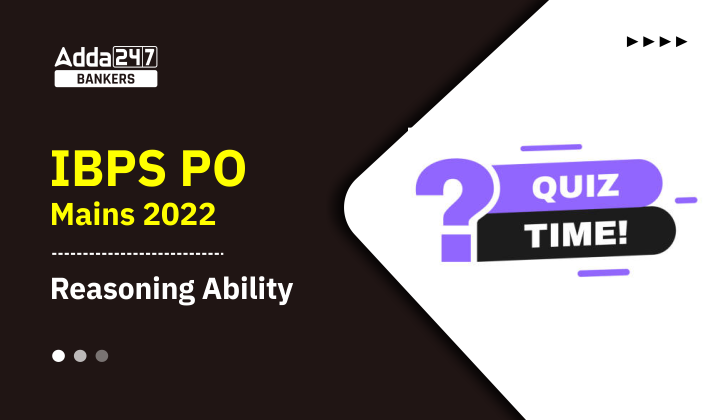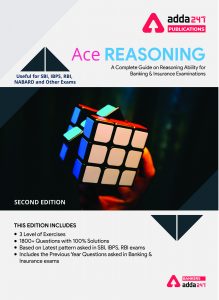Directions (1-5): Answer the questions based on the information given below.
M & N means M is neither smaller than nor greater than N,
M # N means M is neither greater than nor equal to N,
M ! N means M is not smaller than N,
M * N means M is not greater than N,
M @ N means M is neither smaller than nor equal to N.
Q1. Statements: C # H ! Q * T @ S ! K
Conclusion: I. K & Q II. T @ C
(a) Only I is true
(b) Only II is true
(c) Either I or II is true
(d) Neither I nor II is true
(e) Both I and II are true
Q2. Statements: R & P & V ! S # M, W @ V
Conclusions: I. S & P II. W @ R
(a) Only I is true
(b) Only II is true
(c) Either I or II is true
(d) Neither I nor II is true
(e) Both I and II are true
Q3. Statements: X ! C * L @ P # F
Conclusions: I. L # X II. X @ P
(a) Only I is true
(b) Only II is true
(c) Either I or II is true
(d) Neither I nor II is true
(e) Both I and II are true
Q4. Statements: J * K & P # U ! G @ F
Conclusions: I. U @ J II. F & K
(a) Only I is true
(b) Only II is true
(c) Either I or II is true
(d) Neither I nor II is true
(e) Both I and II are true
Q5. Statements: B * H @ Z ! D & C @ R
Conclusions: I. R # D II. B @ Z
(a) Only I is true
(b) Only II is true
(c) Either I or II is true
(d) Neither I nor II is true
(e) Both I and II are true
Directions (6-10): Answer the questions based on the information given below.
X $ Y means ‘ X is not smaller than Y’,
X @ Y means ‘X is neither smaller than nor equal to Y’,
X # Y means `X is neither greater than nor equal to Y’,
X + Y means `X is neither greater than nor smaller than Y’,
X * Y means ‘X is not greater than Y’.
Q6. Statements: T @ M, M # O, O + E, E * V
Conclusions: I. O * V II. E @ M
(a) Only I is true
(b) Only II is true
(c) Either I or II is true
(d) Neither I nor II is true
(e) Both I and II are true
Q7. Statements: C # L, L * U, U @ F, F $ J
Conclusions: I. U @ J II. C @ U
(a) Only I is true
(b) Only II is true
(c) Either I or II is true
(d) Neither I nor II is true
(e) Both I and II are true
Q8. Statements: S + C, C $ Y, Y # P, P * O
Conclusions: I. O * Y II. P @ S
(a) Only I is true
(b) Only II is true
(c) Either I or II is true
(d) Neither I nor II is true
(e) Both I and II are true
Q9. Statements: R * E, E $ G, G # M, M @ S
Conclusions: I. R # G II. E @ S
(a) Only I is true
(b) Only II is true
(c) Either I or II is true
(d) Neither I nor II is true
(e) Both I and II are true
Q10. Statements: A $ B, B @ D, D + C, C # L
Conclusions: I. A @ C II. B # L
(a) Only I is true
(b) Only II is true
(c) Either I or II is true
(d) Neither I nor II is true
(e) Both I and II are true
Directions (11-15): A number and word arrangement machine when given an input line of numbers and words rearranges them following a particular rule in each step. The following is an illustration of an input rearrangement.
Input: Academic 60 Magenta 40 Narrow 75 55 True
Step I: 75 Academic 60 Magenta 40 Narrow 55 True
Step II: 75 60 Academic Magenta 40 Narrow 55 True
Step III: 75 60 55 Academic Magenta 40 Narrow True
Step IV: 75 60 55 40 Academic Magenta Narrow True
Step V: 75 60 55 40 True Academic Magenta Narrow
Step VI: 75 60 55 40 True Narrow Academic Magenta
Step VII: 75 60 55 40 True Narrow Magenta Academic
Step VIII: 75 60 55 40 16 36 49 64
Step IX: 04 12 00 08 10 06 10 04
And the step IX is the last step of the rearrangement. As per the rules followed in the above step, find out for each of the following questions the appropriate step of the given input.
Input: 46 bacteria 23 52 arrange 78 robot risk
Q11. How many steps are required to get the final step?
(a) Six
(b) Seven
(c) Eight
(d) Nine
(e) None of these
Q12. How many numbers are smaller than 8 in the final step of the given input?
(a) Three
(b) Two
(c) Five
(d) Four
(e) More than five
Q13. Which of the following is the second last step of the given input?
(a) 78 52 46 23 49 64 16 25
(b) 78 52 46 16 23 25 49 64
(c) 78 46 52 23 16 25 49 64
(d) 78 52 46 23 16 25 49 64
(e) None of these
Q14. Which of the following element is fourth to the left of ‘risk’ in step IV of the given input?
(a) 52
(b) 78
(c) Robot
(d) Arrange
(e) None of these
Q15. In which of the following step, ‘46 23 risk bacteria’ will appear in the same sequence?
(a) Step III
(b) Step IV
(c) Step V
(d) Step VI
(e) None of these
Solutions






 GA Capsule for SBI Clerk Mains 2025, Dow...
GA Capsule for SBI Clerk Mains 2025, Dow...
 The Hindu Review October 2022: Download ...
The Hindu Review October 2022: Download ...
 ECGC PO Cut off 2025 Out, Check Final Cu...
ECGC PO Cut off 2025 Out, Check Final Cu...




